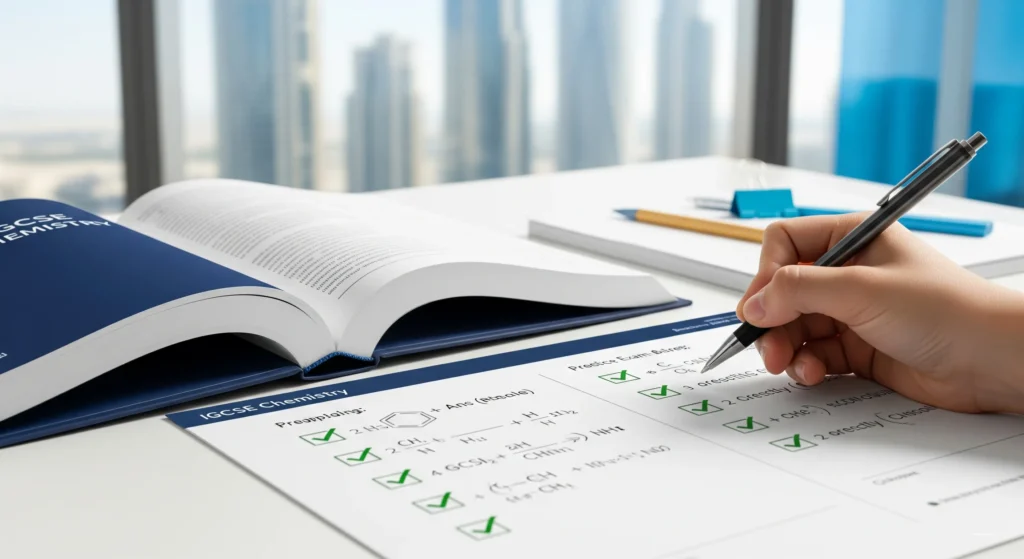How to Ace Your IGCSE Chemistry Exams: A Step-by-Step Guide
The IGCSE Chemistry syllabus can feel like a vast landscape of complex formulas, abstract theories, and intricate reactions. For many students in Dubai and around the world, it's one of the most challenging subjects, but it's also one of the most rewarding. A high grade in IGCSE Chemistry doesn't just look great on your record; it builds a powerful foundation for future studies in medicine, engineering, and environmental science.

So, how do you move from simply passing to confidently acing your exams?
The answer isn’t about having a “natural talent” for science. It’s about having a strategy. This step-by-step guide will provide you with the structure, techniques, and revision strategies you need to master the content and walk into your exam hall with confidence.
Step 1: Understand Your Battlefield - The IGCSE Exam Structure
Before you can plan your attack, you need to know what you’re up against. Most IGCSE Chemistry courses (like Cambridge and Edexcel) have a similar structure, typically consisting of three papers:
Paper 1: Multiple Choice Questions (MCQ):
This paper tests the breadth of your knowledge across the entire syllabus. It’s a race against time, requiring you to recall facts and apply concepts quickly.
Paper 2: Theory Paper (Structured & Short-Answer Questions):
This is the core of your exam. It tests your deep understanding of chemical principles, your ability to explain concepts, and your problem-solving skills.
Paper 3: Practical Skills (Practical Test or Alternative to Practical - ATP):
This paper assesses your understanding of experimental chemistry. You’ll be tested on designing experiments, handling data, and identifying sources of error. The ATP is a written paper where you answer questions about experiments you may not have personally conducted.
Knowing the weighting and format of each paper is crucial. It tells you where to focus the bulk of your revision time.
Step 2: Master the Pillars - The Most Important Topics
While you must cover the entire syllabus, some topics are more fundamental and carry more weight than others. Mastering these “pillar” concepts will make learning everything else much easier.
The Mole Concept & Stoichiometry:
his is the language of chemistry. If you don’t understand the mole, you will struggle with almost every calculation-based question. Spend extra time here until it clicks. Practice calculations involving mass, moles, and gas volumes until they become second nature. Because this topic is so foundational, it’s often the first area where students seek extra support. Getting one-on-one help from a specialist IGCSE chemistry tutor can build a strong base for the rest of the co
Organic Chemistry:
For many, this is the most intimidating topic. The key is to learn the homologous series (alkanes, alkenes, alcohols, etc.) systematically. Don’t just memorize reactions; understand the type of reaction (e.g., addition, substitution).
Redox Reactions:
Understanding oxidation and reduction is essential. You need to be able to assign oxidation states and identify oxidizing and reducing agents confidently.
Acids, Bases, and Salts:
This includes everything from the pH scale to titration calculations. Titration questions are a guaranteed feature of the exam, so practice them relentlessly.
Step 3: Revise Smarter, Not Harder - Proven Study Techniques
Reading your textbook from cover to cover is not an effective revision strategy. Your brain needs to be actively engaged.
Blurting / Active Recall: Read a chapter, close the book, and write down everything you can remember on a blank piece of paper. Then, open the book and check what you missed. This forces your brain to retrieve information, which is far more powerful than passive reading.
Mind Mapping: For topics like organic chemistry or electrolysis, create mind maps. Start with the central concept and create branches to link related ideas, reactions, and conditions. This helps you see the connections and the big picture.
Understand Command Words: Know the difference! “State” means a short, factual answer. “Suggest” requires a scientific hypothesis. “Explain” demands a detailed reason using your chemical knowledge. “Describe” means you should state the main points of a topic or process. Misinterpreting these can cost you easy marks.
Step 4: The Ultimate Weapon - Past Paper Practice
This is, without a doubt, the single most important part of your revision.
Start Early: Don’t wait until the last month. Start doing past papers topically after you finish each chapter to solidify your understanding.
Full Papers Under Timed Conditions: In the final months leading up to your exam, you must practice doing full papers under strict timed conditions. This builds your stamina and helps you manage your time effectively during the real exam.
Analyze Your Mistakes: Don’t just mark your paper and forget about it. Create a “mistake log.” For every question you got wrong, write down the topic, why you got it wrong (e.g., calculation error, forgot a definition), and the correct answer. Reviewing this log is one of the most effective revision techniques.
When you’re reviewing a difficult mark scheme, it can sometimes be hard to understand why certain answers get marks and others don’t. This is where personalized feedback can be a game-changer. Working through your mistakes with an experienced IGCSE chemistry tutor in Dubai can provide invaluable insight into how to think like an examiner.
Conclusion: Your Path to a High Grade
Acing your IGCSE Chemistry exam is a marathon that rewards strategic and consistent effort. By understanding the exam structure, mastering the pillar topics, and committing to a rigorous past paper schedule, you put yourself in the strongest possible position to succeed.
Remember to work smart. Use active revision techniques and analyze your weaknesses so you can turn them into strengths. Don’t be afraid to ask for help when you need it; every top-performing student does.
If you are ready to build a comprehensive preparation plan and walk into your exams with confidence, learn more about how our specialist tutors can help you achieve your goals. With the right strategy and support, that top grade is well within your reach.